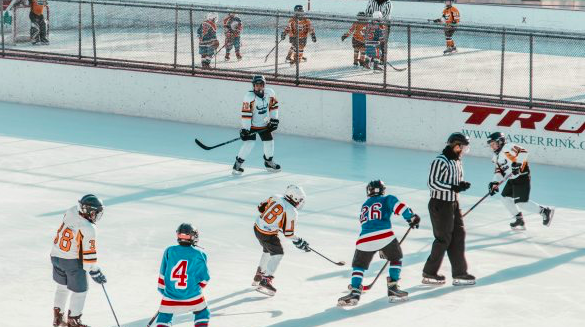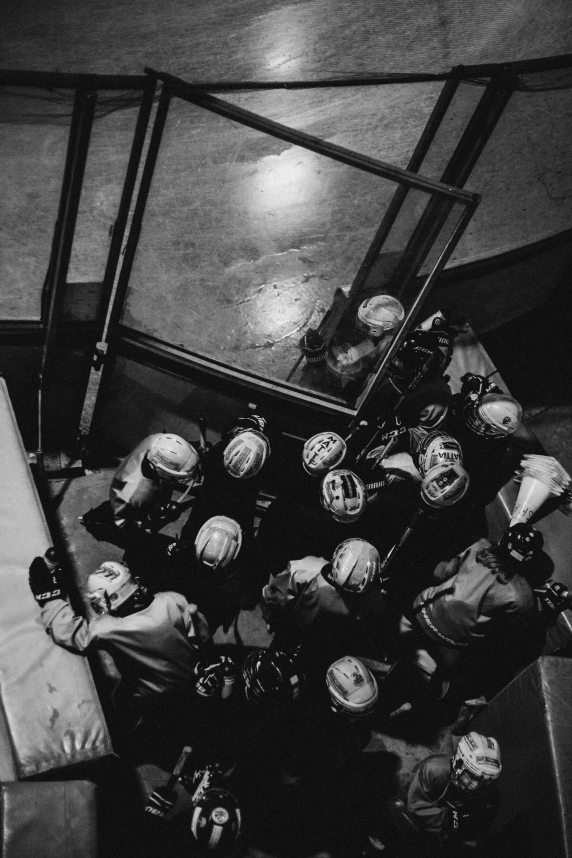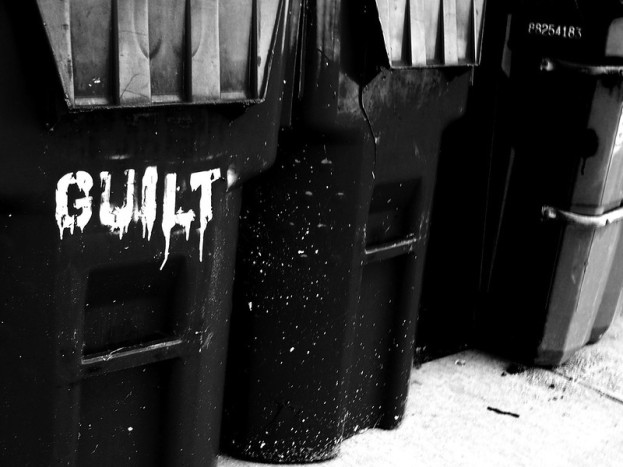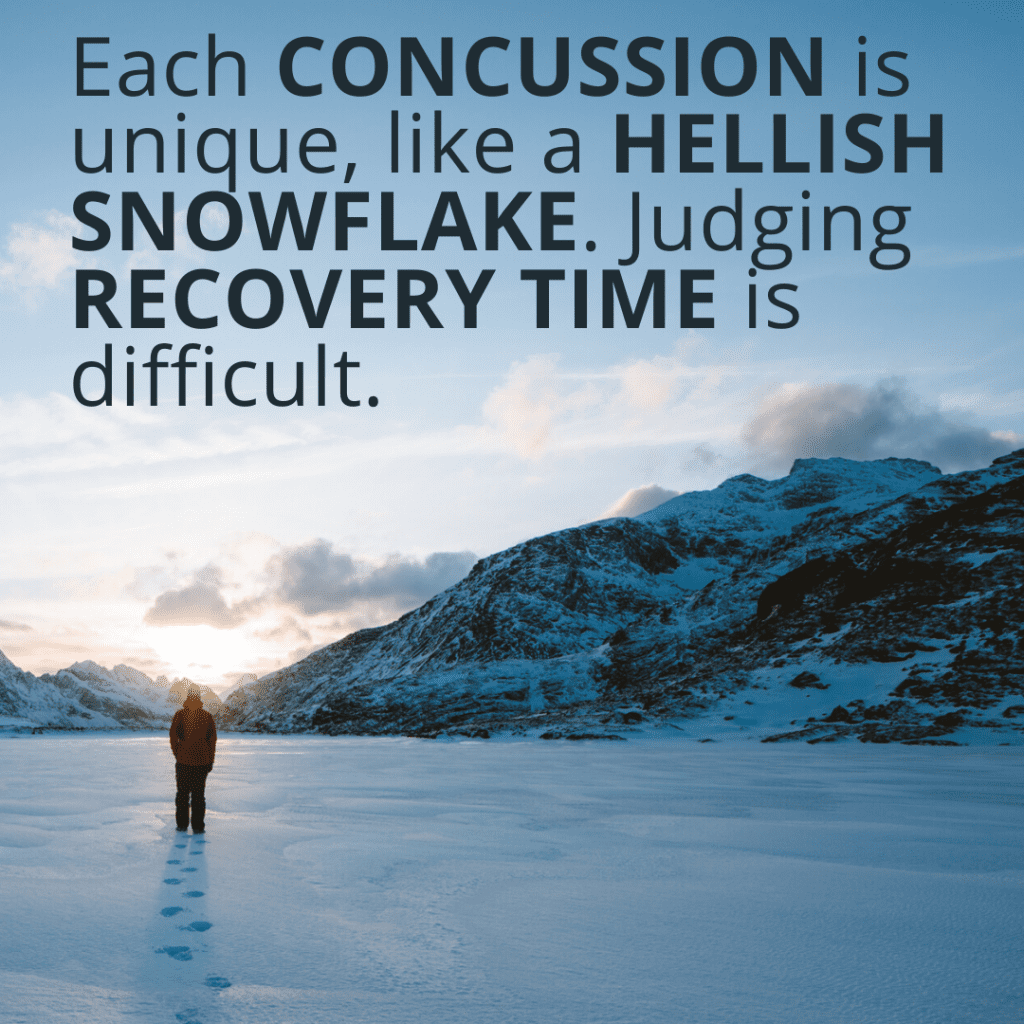
BY: LOGAN JUNG-RITCHIE
Hello everyone, my name is Logan and I live and work here in Toronto with my wife Renée. I have recently become a member of BIST in hopes to connect with others that have gone through similar injuries and challenges I have. So, to begin I thought I would share with you my story with concussion.
I grew up in a very rural part of Canada, where hockey is a way of life. Everyone plays, watches, and has a favourite NHL team.
In small town Northwestern Ontario, the local high school team is a community centrepiece. When I moved up North from a southern town just about an hour outside of Toronto, I was the new kid in town heading into grade two, and I just wanted to fit in. I had to join the hockey team.
While I never quite managed to fit in off the ice with the guys who were born and raised in town, but on the ice I did. I placed value on myself for how I performed. Part of the culture around the game is that showing any type of vulnerability is a weakness. Back then, concussions were viewed as a non-issue, “You just got your bell rung, sack up and get back out there!” is the polite way to put it.
I never expected to run into concussion issues and I never took the risk seriously. With the arrogance of a teenager I felt invincible; even though I had suffered two concussions between the ages of eight and 12. Neither was I terribly serious in terms of recovery time, but I mention them because they set the stage for more severe incidents later on.
I was one of two players to make the high school team as a freshman, and I thought that could be a springboard for me to play higher levels within a couple years. I was sufficiently self-aware to know that I wasn’t good enough to play any sort of professional level, but the idea of playing for a university team was realistic. Between the ages of 16 and 17, I received a few offers to play at a higher level. However, I never accepted any of them because by that time I had grown disillusioned with the ‘hockey culture’. There were some things I just wasn’t willing to do so I decided that going to university and focusing on my studies was more important to me. I still intended to be a part of the game, playing in recreational leagues, for example. I did not want to leave it all behind me, but I had simply changed my priorities.
Playoffs during my final year of high school were the end of a chapter. In what was to be my last home game, my parents were in the stands along with a lot of friends, so I was flying high with emotion. In the second period of the game, a puck got caught in my feet from an errant pass and I had to turn to face the boards to fish it out. The captain of the other team was on top of me quickly and while my back was turned, in the most dangerous position on the ice, he hit me ruthlessly from behind. I went into the boards head first, the point of impact being the crown of my head. Funnily enough, I cannot recall much about the days following, but I remember that moment crystal clear. The first thought that went through my head was my neck was broken. That hit is incredibly dangerous, and has left other players paralyzed. My parents happened to be sitting right where it happened so they had a front row view. My Dad told me afterwards he thought I was paralyzed with the way I was lying on the ice not moving. By some stroke of good fortune—I wasn’t, but I was severely concussed. I had a splitting headache, nausea, blurred vision, and my head felt like a pressure cooker. The team doctor diagnosed me right away and took me through the treatment protocol, which doesn’t amount to much besides rest and avoiding stimuli such as noise, light, and screens. My Dad helped me out of my gear and I showered barely able to stand upright.

After the game, my coach’s main concern was if I could play the following night. I couldn’t be in a lit room never mind skate or take another hit. He looked at me as if I was a disappointment. I felt weak and his reaction filled me with a sense of shame. I was team captain. I was supposed to be the leader, strong and infallible. I now know that there was no reason to be ashamed; but at the time, some support from a person I’d looked up to for five years would have gone a long way. I remember being in shock at how close I came to my life being forever changed, and it stung that he could brush that moment off as if nothing happened. If I’m being honest, that reaction created a lot of resentment and anger that I still hold onto today. At that point, I was grateful just to be walking out of the rink, so recovery was not something I was concerned with. That would change as the months wore on and the symptoms continued to remain persistent. It is because of this injury that I made the decision to walk away from hockey permanently.
I thought, at the time, it was the game that ended it for my brain, but really it was my brain that ended my game. I made the decision, no one else. It was the only way to ensure my brain could take care of itself.

Funny thing about concussions, the recovery process starts right away. But unlike a broken bone that feels less painful or a surgery scar that starts to fade, symptoms can ease and you feel better one day—only to wake up the next day worse off than a week before.
Once your symptoms decrease, doctors will tell you to take it slow and increase activity incrementally. I was impatient to return to myself, feeling weak and vulnerable were not welcome feelings for me. During this time, I’d often be reminded how close I came to paralysis, thoughts which would bring on episodes of panic. Instead of relief, I often felt depressed, anxious and guilty. The other thing I felt was anger towards the player who hit me. It was a filthy, gutless play which all players are taught to avoid. I also felt anger towards my defence partner for putting me in that position (this was unfair on my part and nothing more than self-pity). I even felt anger at my coaches and teammates for ignoring me after the injury and for laughing when I attempted to express my anxiety. But the most anger I felt was towards myself. I was the one who turned my back. A former coach of mine would have been ashamed of me. You never turn your back, ever. But I did. That guilt still wears on me to this day.
Without the support of my parents, I think I would have sunk into a dark place. They always lifted me up and gave me the time I needed. But in that time following the injury, I felt very lost.
In hindsight, I recognize that I went back into training too soon. I probably should have taken the spring sports season to fully heal. But I was adamant I wanted one last hurrah before heading off to university, so I geared up for the soccer season. Soccer, the sport that involves hitting a flying object with your head, perhaps not my best decision. But I made it through the season with no incident and left high school onto a new adventure. I hoped that this injury was the last and all concussion issues were behind me.
In my first year at university, while attempting to adjust to a move 2000 km from home, I suffered my fourth concussion while playing intramural soccer (against a team from our Med School, no joke).
Each concussion is unique, like a hellish snowflake. Judging recovery time is difficult, even for specialists. Happening so close to my last concussion, I was sure that I would be feeling the effects for weeks if not months, which would have been catastrophic to my exam hopes. But, surprisingly, symptoms cleared within a week and I was back to my normal self. The guy who was the best man at my wedding took me to the emergency room, and he made sure I was able to sleep properly without complications from the injury. Such support meant everything to me and I believe it is vital to proper recovery.
After that, I went five years without one concussion. This was a relief to me as I started to learn more about some of the research concerning repetitive brain trauma and CTE in athletes. However, while I was on holiday with my girlfriend and parents in the summer of 2017, a late night, bleary eyed trip to the bathroom resulted in a significant collision with a door frame. As ridiculous and embarrassing as the accident was, I have never had a feeling like that. My head felt like it was in a vice grip. I was knocked loopy and could barely form a proper sentence. When I woke up in the morning, the pressure in my head was worse and I felt like I was in a fog. It was incredibly odd to be conscious and yet feel like everything around me was passing by while I was locked in my own mind. Not being unfamiliar with the drill, I knew rest was crucial—so naturally I had to jump on a flight the next day, to get back to school, where the pressure changes and noise would cause the symptoms to worsen. Once I arrived back at school, though, I was hopeful that the symptoms would clear up quickly.
They didn’t. After a couple days of not listening to my head and strangling pressure, I decided to take time away and rest. For two weeks I laid on the couch or in bed staring at the ceiling and sleeping. The most I allowed myself was to listen to the radio in an effort to avoid losing my mind. At the end of two weeks I wasn’t healed, not even close, but I convinced myself I needed to go back to school and finish my Master’s thesis. I was a month away from my defence and my funding was set to expire, so I felt delaying was not an option. So I fought through the headaches, dizziness, and fatigue. Somehow I made it through and successfully defended my thesis, but afterwards I was completely exhausted and needed to rest.
Here’s the thing about post-concussion syndrome. People can’t see the hurts or fog. As time wore on, and my symptoms remained the same, I felt at greater pains to explain to others and myself why I wasn’t healing. It made me feel like a wimp for not ‘grinding through’, and I think that frustration and embarrassment took a toll.
For the first time post-concussion, I experienced mood swings. Sharp mood swings. I could go from happy and upbeat, to sad, depressed, even tearful, and then into a blinding rage within minutes. From some of the reading I had done on recovery, I knew this was experienced by others who had suffered multiple injuries, but you are never prepared for it to happen to you. Being so far away from my parents and girlfriend (who had moved across the country for her first post-university job opportunity), physically separated me from my primary support system. Despite this, they did more than I could have ever asked for. They honestly pulled me through to the other side of my darkest time. I’m not sure what would have happened without them. Renée was even able to make me laugh! Through it all, they helped me keep faith that the pressure would ease and the headaches would go away.
Not that there is ever a good time to be concussed, but getting one right at the end of my Master’s was extra difficult because it came right at a massive turning point in my life. After university, I started searching for my first job, feeling the stress of bills to pay and needing to find a new place to live. Everything was changing at once and I couldn’t keep up. It was all I could do to get out of bed in the morning. It felt like I was locked away in my head while life passed me by. My lowest point during recovery would be mid-November, three months after hitting my head, when I went for a walk on a trail as flat as a pancake and within five minutes my head felt like it would explode. This happened after what I thought was a series of ‘good days’, and left me feeling completely defeated, like I would never get better and that normal would never return. I remember thinking to myself: “I’m a geologist, how on earth could I make anything of myself if my brain is mush?”
At that point, my family doctor decided to send me to a specialist. I was told that any more concussions would most likely result in a recovery time of at least six months. As an added bonus, I was strongly advised to quit all contact sports, which made all the sense in the world.
In a strange way, my experience has helped to understand my new normal. Not that I recommend going out and getting your head smashed in, but it did help me get to the point of accepting that some things needed to be kept in the past and I need to embrace new challenges and ideas to move forward. Scientific literature and anecdotal evidence will describe mood swings, changes in personality, and a tendency towards depression as potential lasting effects of multiple concussions, and I have noticed this to a certain extent in myself. I have to work harder to keep my mood up and it’s easier to fall into a depressive state. But it’s not scary anymore, it’s empowering.
These events happened to me, I cannot change that. I cannot change the nature of the game, I cannot prevent the next player from turning their back, and I cannot prevent the next late night bathroom trip (I am getting older). I also cannot change the choices I made while in recovery or the attitudes of others around me. But what I can do is reach out, learn, and listen; because I am far from the only person who has or is going through this.
And that brings me to the point of writing this and sharing my story in its entirety, for the first time. The only other person who I’ve told in this detail is my wife (Renée, who was my girlfriend I mentioned earlier in this story). It is my hope that perhaps by sharing my experience that someone who is going through something similar or is a support to someone knows that even though it can feel like it they are not alone and things can get better with time and resilience.
FEATURED IMAGE: ARTHUR BROGNOLI FROM PEXELS
Logan Jung-Ritchie lives in Toronto with his wife Renée. He is a former hockey player turned geologist working for an environmental consulting firm. He wants to write about my experiences with concussion not just in association to hockey, but also in everyday life. He says, “I hope that by sharing my journey with this brain injury that I can connect with others who have had or are having similar experiences.”





